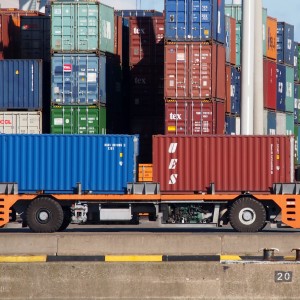Is International Shipping About to Be Disrupted by the 4th Industrial Revolution?
Big, bold letters reading, “Fourth Industrial Revolution will disrupt shipping” headline an article Wolfgang Lehmacher wrote for the Journal of Commerce (JOC). Is this just a sensational headline or are we really hitting a new revolution that will disrupt the international shipping industry?
 For the past few years, we’ve been hearing about how digitization is about to revolutionize container shipping with Silicon Valley sinking millions of dollars into startups that were supposed to drive traditional freight forwarders out of business with online international shipping platforms.
For the past few years, we’ve been hearing about how digitization is about to revolutionize container shipping with Silicon Valley sinking millions of dollars into startups that were supposed to drive traditional freight forwarders out of business with online international shipping platforms.
For the most part, these freight e-commerce companies and platforms have flopped. The Loadstar even posted an article by Gavin van Marle telling readers not to believe the hype, quoting Alphaliner in the headline as saying, “There is a long way to go before digitisation revolutionises container shipping.”
However, this Fourth Industrial Revolution thing seems different than outsiders from the Silicon Valley trying to infiltrate international shipping with their tech-driven business models, even though both the Fourth Industrial Revolution and freight digitization are heralded as game changers for international shipping through new technology.
What even is the Fourth Industrial Revolution?
The term seems to be originated by Professor Klaus Schwab. At the very least, he wrote the book entitled The Fourth Industrial Revolution.
I like how Bernard Marr frames it in an article he wrote for Forbes. “First came steam and water power; then electricity and assembly lines; then computerization… So what comes next?”
The answer he’s leading to is, of course, the Fourth Industrial Revolution (4IR). Marr also points out that some call it industry 4.0.
What it is called is not so important. What really matters is that this industrial revolution is different than the three that came before it, utilizing new technologies that combine the physical, digital, and biological worlds in a way that will profoundly affect all industries of the world. Perhaps, it will even impact our view of what it means to be human.
At least, that’s what Schwab and these articles about his 4IR are saying about it.
New technologies of 4IR include artificial intelligence, automated vehicles, and nanotechnology. Yes, the more I read about 4IR, the more it sounds like the science fiction I grew up with as a kid (and still enjoy today).
But much of the science fiction of my childhood isn’t fiction now. Reading off our phones and tablets looks a lot like the reading they did in Star Trek. Where those fictional characters would say, “Computer,” we say, “Siri” or “Okay Google” now.
We don’t have the automated car systems of Minority Report or I, Robot, but automated cars and trucks are in production. We even posted two blogs recently about automated cargo ships that are supposed to hit the water next year:
WORLD’S FIRST AUTOMATED CARGO SHIP IS ON THE WAY
COULD THIS CONTAINER SHIP BE THE BIGGEST THING TO HIT TRANSPACIFIC SHIPPING?
Automated container ships is just the tip of the iceberg. 3D printing, internet connectivity of all aspects of business--including shipping, AI, electric vehicles, quantum computing, biotechnology… All these things and more are part of this 4IR.
It is very plausible that we are right on the edge of a huge industrial revolution that could make the world look like science fiction movies of the 80’s or 90’s.
The JOC article quotes a keynote address Wolfgang Lehmacher gave at the World Economic Forum:
“The world will significantly change,” he said. “The shipping industry has been impacted by the previous industrial revolutions: It moved from sail-powered shipping to steam-powered shipping in the First Industrial Revolution, to oil-powered shipping in the Second, to satellite guided navigation and digital transport in the Third. The [4IR] is expected to bring to the sector networks of autonomous vehicles.”
The article went on to quote Lehmacher quoting Schwab. Yes, and me quoting it here makes it a quote within a quote within a quote (if we were talking dreams, this would be Inception):
“The changes unleashed by the 4IR are so profound that, from the perspective of human history, there has never been a time of greater promise or potential peril.”
The imagination could easily run away with what this could look like. My mind immediately jumps to what kind of science fiction movies this could inspire, as if it hasn’t already (Ex Machina, anyone?). But what is the disruption headlining the JOC article that this new technology would necessarily bring to shipping?
Well, here’s where Lehmacher gets into disruption in the JOC article:
Although disruption would be unavoidable, Lehmacher said in the past, it came largely from within the industry where new players with new technologies took market share from less advanced players.
“In the 4IR, not only the changes within shipping, but also the changes in other industries will have significant impact. Let’s take the automotive industry. The move towards electric vehicles will disrupt the world in a big way. Electric vehicles have less moving parts and run more mileage than combustion engine powered vehicles. This means less maintenance, less spare part, less cars sold, less parts and cars to be transported; of course also less oil needed, sold, and transported,” he said.
So in other words, this 4IR will hit the international shipping industry from all angles because it will be hitting all the industries of the world. And, as we all know, international shipping plays a role in almost all of them, transporting 90% of the world’s goods.
Just from the example given, shipping takes a hit, losing items that are shipped. Of course, as certain items decrease in demand, it seems like other items will increase in demand. I am not sure that argument exactly adds up to a necessary disruption to international shipping.
The other premise of disruption to shipping appears to be that a change in and of itself automatically results in disruption.
I am not entirely sure that is true either. A shift to automated ships could very well be extremely disruptive as laws have to change and flaws will have to be fixed. However, I could imagine a smooth transition too.
It seems hard to imagine a major global industrial shift that 4IR describes would happen without hiccup. And, of course, the wealthy are the ones most likely to benefit early on and be in the best place to handle major economic upheaval that could happen if the transition is not a smooth one.
Ultimately, we’ll have to see if this Fourth Industrial Revolution really does disrupt the international shipping industry. We do know, the industry is certainly entering a time of change.




